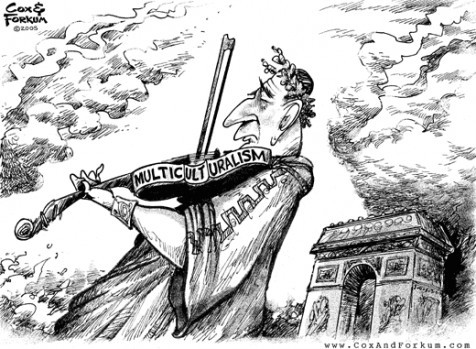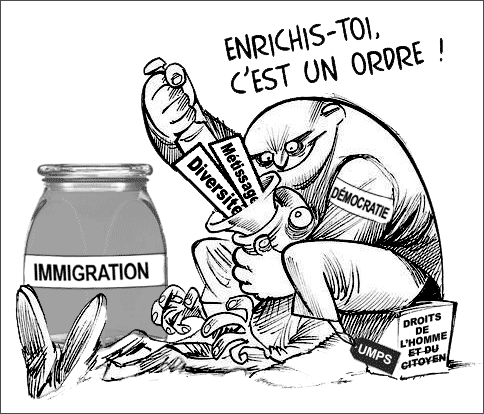dimanche, 22 avril 2012
The Multicultural Theocracy: An Interview With Paul Gottfried

The Multicultural Theocracy: An Interview With Paul Gottfried
Myles B. Kantor
Thursday, Dec. 5, 2002
Ex: http://archive.newsmax.com/
Paul Gottfried is Professor of Humanities at Elizabethtown College. An adjunct scholar of the Ludwig von Mises Institute and contributing editor to Humanitas and Chronicles, he is the author of several books including "The Conservative Movement," "Carl Schmitt: Politics and Theory" and "After Liberalism: Mass Democracy in the Managerial State." His new book is "Multiculturalism and the Politics of Guilt: Toward a Secular Theocracy."
You observe, "Nothing could be more misleading than to equate a multicultural society with a multiethnic one." What distinguishes a multicultural society from a multiethnic one?
Multiethnic societies have been recurrent political phenomena and involve the coexistence of more than one ethnos, that is, national community, living in the same jurisdiction. Such an arrangement has usually come about because of conquest or dynastic inheritance and until now has never required a celebration of diversity. Multiethnic societies have almost always been empires because of the way they have been formed and because of their lack of cohesion beyond the fact of what Thomas Hobbes called "acquired sovereignty." Moreover, unlike multicultural regimes, multiethnic ones do not celebrate sexual exotica or the nonrecognition of separate gender identities. Multicultural regimes are inherently subversive of traditional social relations.
You frame the multicultural question as fundamentally governmental in nature: "For all their complaints about 'political correctness,' moderate conservatives...do not devote their primary attention to the government's control of speech and behavior. The battle between supporters and opponents of political correctness is thought to be taking place among warring cultural elites." What is the consequence of viewing multiculturalism as a purely cultural phenomenon?
The fact that neoconservatives – the anti-Communist liberals, once identified with Daniel Patrick Moynihan, Henry "Scoop" Jackson and Hubert Humphrey, who took over the conservative movement with only minor opposition in the 1980s – have been able to treat multiculturalism as an hermetically sealed cultural and academic problem has allowed them to go on glorifying the current American regime as the paradigmatic global democracy. (Read the second edition of my book "The Conservative Movement" for a detailed description of the neoconservative ascendancy and the marginalization of everyone to the right of the Cold War liberals.)
Their other avoidance of the truth in order to spare the government that they want to expand is presenting the state as the hapless victim of bad culture. My own perspective is diametrically opposite. It is trying to understand the role of multiculturalism as a politically enforced ideology. Multiculturalism has the same relation to the present managerial state as the Catholic Church did to medieval European monarchies. It travels in the baggage of the American empire, as was evident during the unprovoked attack on Serbia.
You often refer to "the managerial state," "the administrative state," and "the therapeutic state." What are these phenomena and their relationship to multiculturalism?
State administrations have been around since the High Middle Ages, while the managerial state refers to the social engineering, redistributionist regime that came into existence with mass democracy in the twentieth century. (Mass democracy is a term used to describe a government that rules in the name of the "people" but is highly centralized and operates increasingly without an ethnic-cultural core. It is a bureaucratic empire that distributes political favors and provides a minimal level of physical protection but is no longer capable of or interested in practicing self-government.
In "After Liberalism," which precedes my latest book, an attempt is made to plot the development of modern administrative "democracy" from a more limited and nationally focused state that existed a hundred years ago. What happened is that, contrary to what nineteenth-century critics of democracy believed, universal suffrage and urbanization did not lead to the outbreak of anarchy and violent expropriation. Rather the people voted to hand over power to "public administrators" and more recently in the U.S. judges, who became the agents for practicing democracy on our behalf. Democracy was not equated with meaningful self-rule but with being socialized by administrators, who taught us "equality" and later, pluralism and multiculturalism. )
That mass democratic regime has turned progressively therapeutic, with the advent of the cult of victims and the degeneration of Christianity into a purveyor of the politics of guilt. Question two misses a point: I am not except in a negative sense a libertarian. Through most of its history, the state, in my opinion, has been a positive force, assisting the rise of the bourgeoisie in Western Europe more than hindering that development and providing a uniform system of law protecting persons and property. The good state reached its high point in the nineteenth century but was overtaken by mass democracy and the managerial revolution in the twentieth century.
I am also not an enemy of all forms of democracy and totally approve of the management of my own town by small property-owners who come out of a shared rural culture. Unfortunately the hand of PC is already upon us as the demonic state and federal behemoths (the first is only an agent of the second) invade our civic and family life.
What are some examples of those behemoths invading civic and family life?
Examples of PC enforcement by the state are the use of Title Nine to impose verbal and behavioral conformity on male academics and workers; the various hate speech laws that exist in Canada and Europe and are applied almost exclusively against white Christian European; and the delegitimation of the historical heritage of victimizing groups: e.g., the war against Southern symbols and iconography waged, in among other areas in the US, public education [e.g., dress codes prohibiting attire with a Confederate flag].
The BBC recently had a headline, "Hate crime police raid 150 homes," about an operation in London administered by a "Diversity Directorate." Sweden recently passed a law criminalizing the "disrespecting" of homosexuals.
This attempt to muzzle traditional Christians is perfectly consistent with both the multicultural values of the therapeutic state and the thrust of liberal Christianity. In fact what is happening in England and Sweden is the disciplining by the government of Christians who have not accepted the Protestant deformation. A by now transformed Christianity, which is as grotesque in its own way as Hitler's Nazified Evangelical Church, has allied itself to the state that is suppressing Christians who will not go along with PC indoctrination.
On the matter of Hitler, perhaps the most sensitive instance of the politics of guilt you discuss is contemporary treatment of the Holocaust. You write, "By now all Christians have been generically indicted for the Holocaust, which has been extended to gays and explained in such a way as to minimize the suffering of identifiably Christian victims."
Members of my family were worked to death in Nazi labor camps; some died of typhus soon after being liberated. Needless to say, I am not a Holocaust denier. Indeed I am profoundly offended by the attempts to draw parallels between Nazi Germany and the German Imperial government, on the grounds that the latter was a "defective constitutional regime."
The Nazis were reprehensible not for establishing a second-class constitutional government but for turning Europe into a death camp. What I oppose is not the recognition by the establishment Left that the Nazis killed millions of people but the use of anti-fascism as a tool of control. This instrumentalization has been cynically carried out by political elites, European Commies, and academics throughout the West.
A very useful book on this subject in French by Elisabeth Levy shows how completely the totalitarian Left suppresses opposition in France by identifying all dissenters as Nazis or fascists. Supposedly by making a case against increased Islamicist immigration into France, one incites fascist hate and prepares the way for a second Auschwitz.
Read Peter Novick's "The Holocaust in American Life" for a striking account of the changes in Jewish attitudes about who or what caused the Holocaust. Novick maintains that what has fueled this new animus against "Nazi-bearing" Christianity has nothing to do with scholarly revelations. Rather it has arisen out of Jewish repugnance for Christianity at a time when Christians have certainly not persecuted Jews. To the contrary, Christians are the only possible allies that the Jews can now claim.

You referred earlier to "the Protestant deformation." What is it and its relation to the multicultural theocracy?
In the U.S., what the Presbyterian scholar James Kurth (see my intro chapter) calls the "Protestant deformation" has profoundly influenced the spread of multiculturalism. Although Catholic clergy, as revealed by the Italian study "L'invasione silenziosa" (The Silent Invasion), have expressed many of the same xenophile sentiments, calling for massive Third World immigration to offset Western parochialism and bigotry, in the U.S., Canada and England, Protestants have taken the lead in pushing both multicultural ideology and the politics of guilt.
Kurth tries to explain this by looking at the progressive deterioration of Protestant theology and moral culture since the nineteenth century. At the heart of the problem is the transformation of justified spiritual guilt into social guilt and the Protestant focus on the individual into a rejection of membership in a shared civilization that needs to be preserved.
What are the prospects for containing or rolling back the multicultural theocracy?
A deus ex machina that may come along to prevent the worsening of the situation I describe is the rallying by Western nations to a defense of their societies. This may be happening dramatically in Flanders whose people vote for the anti-immigration and anti-welfare Vlaams Blok. Moreover, in Antwerpen there are now armed camps with, on the one side, the Arab European League and, on the other, Flemish nationalists. While such confrontations are not particularly savory, they may prevent the Islamicists and the European Union PC bureaucracy from moving in more quickly to convulse or denature European society.
Note I do not think these battles will solve long-term problems; unless Western peoples start having families again, the social unit and population base needed for a civilization will be lacking. I do not believe that civilizations are purely or even substantially "propositional" or can be sustained by requiring courses on Martin Luther King and global democracy prepared by Harry Jaffa, Bill Bennett, and Mrs. Cheney.
While societies can assimilate, there are three presuppositions that must obtain: a core population that carries a distinctive culture that it hopes to preserve; a minority that is accepted on the condition that it eagerly embraces that majority culture; and a sufficiently controlled immigration so that assimilation is possible.
Contact Myles Kantor at kantor@FreeEmigration.com
Editor's note:
Now we know: "Why the Left Hates America"
00:10 Publié dans Entretiens | Lien permanent | Commentaires (0) | Tags : multiculturalisme, entretiens, paul gottfried |  |
|  del.icio.us |
del.icio.us |  |
|  Digg |
Digg | ![]() Facebook
Facebook



Les commentaires sont fermés.